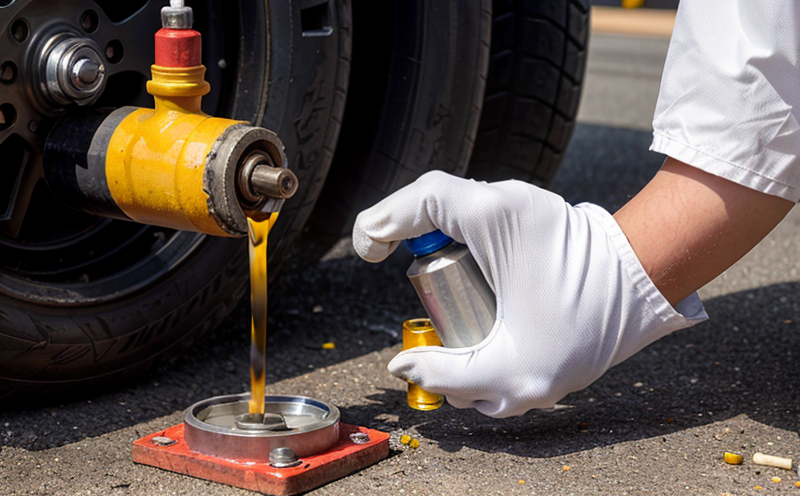ISO 10307 Total Sediment Testing of Residual Fuels
The International Organization for Standardization (ISO) has established ISO 10307:2004, which specifies the procedure for determining the total sediment content in residual fuels. This standard is critical for ensuring fuel quality and performance, particularly in marine environments where fuel contamination can significantly impact engine reliability and efficiency.
Residual fuels are widely used in the maritime sector due to their high calorific value and cost-effectiveness. However, these fuels can contain various types of sediments, including ash, soot, and other particulates, which may originate from combustion processes or be present as manufacturing residues. The presence of these sediments can lead to blockages within fuel systems, reduce the efficiency of engines, increase maintenance costs, and potentially shorten engine lifespans.
ISO 10307 Total Sediment Testing is a vital tool for ensuring that residual fuels meet quality specifications. This test helps in identifying any potential issues with fuel quality before it reaches end-users, thereby protecting both the integrity of marine equipment and operational efficiency. The testing process involves several key steps: sampling, preparation of specimens, analysis using appropriate instrumentation, and interpretation of results.
Sampling is crucial to ensure that the specimen accurately represents the state of the residual fuel in question. This includes collecting samples from various points within storage tanks or distribution systems. Proper sample handling and preservation are also important to avoid contamination during transit to the testing facility.
Once collected, specimens undergo thorough preparation before analysis. This may involve filtering the fuel through specified mesh sizes depending on the desired resolution of sediment detection. The filtered material is then analyzed using optical microscopy, laser diffraction, or other suitable methods outlined in ISO 10307 to quantify particle size distribution and concentration.
The results from this testing provide critical insights into the cleanliness level of residual fuels. These data are essential for maintaining high standards across the marine industry, ensuring that only compliant products reach marketplaces and operations worldwide. Compliance with international standards like ISO 10307 not only enhances reputation but also supports sustainability goals by minimizing waste generation related to fuel-related issues.
Given the importance of this test in safeguarding engine performance and longevity, understanding its applications can help stakeholders make informed decisions regarding procurement processes, quality assurance programs, and preventive maintenance strategies. By adhering strictly to ISO 10307 guidelines during testing procedures, laboratories ensure accurate measurement of total sediment content which contributes significantly towards safer operations within the shipping industry.
Benefits
- Ensures adherence to international standards for fuel quality.
- Promotes better decision-making by providing precise data on fuel cleanliness.
- Aids in identifying potential problems early, preventing costly repairs and downtime.
- Supports sustainable practices through efficient resource utilization and reduced waste generation.
The benefits extend beyond mere compliance; they contribute to enhancing overall operational efficiency and safety within the marine sector. By implementing ISO 10307 Total Sediment Testing, organizations can ensure that their fuels meet stringent quality criteria, thereby reducing risks associated with fuel-related issues such as blockages or improper combustion.
Why Choose This Test
Selecting the appropriate testing method is crucial when dealing with residual fuels in marine applications. ISO 10307 Total Sediment Testing stands out due to its comprehensive approach towards assessing fuel quality. Unlike simpler tests that might miss smaller particles, this standard focuses on identifying all types of sediments present in the sample.
One major advantage lies in its ability to detect even trace amounts of contaminants which could otherwise go unnoticed by less sophisticated methods. This early detection capability allows for proactive measures to be taken against potential problems before they escalate into more severe issues affecting both machinery and personnel safety.
Moreover, the use of standardized procedures ensures consistency across different laboratories performing similar tests worldwide. This uniformity is particularly beneficial in global markets where regulatory requirements vary but require harmonized practices for accurate comparisons between various jurisdictions.
The robustness of ISO 10307 also extends to its adaptability to changing technological advancements and evolving industry needs. As new challenges arise concerning fuel quality, this standard provides a framework for continuous improvement without compromising on reliability or accuracy.
Customer Impact and Satisfaction
- Enhances customer trust by demonstrating commitment to maintaining high-quality standards.
- Improves product reputation through consistent adherence to international benchmarks.
- Promotes long-term relationships based on reliability and dependability of services provided.
- Facilitates smoother business transactions by reducing disputes over non-compliance issues.
Implementing ISO 10307 Total Sediment Testing has far-reaching implications for customers across the supply chain. From manufacturers who produce fuel additives to distributors supplying end-users, every stakeholder benefits from transparent and consistent testing practices. End-customers, especially those operating critical machinery like ships or power plants, find reassurance knowing that their products are rigorously examined according to recognized standards.
This commitment translates into enhanced satisfaction levels as customers receive reliable outputs that meet expected performance metrics. Moreover, it fosters a culture of continuous improvement among suppliers who strive to maintain top-tier quality consistently over time. Ultimately, adherence to ISO 10307 not only protects individual entities but also contributes positively towards broader industry standards and practices.





